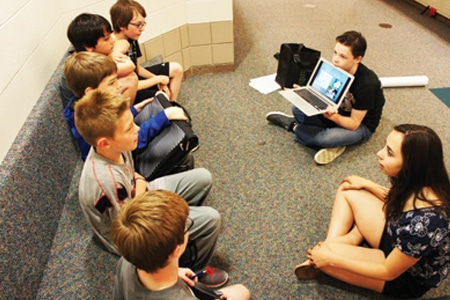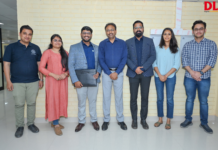
Future schools will incorporate Augmented Reality, Grading and instant feedback through Artificial Intelligence programmes and Virtual Classrooms with more Flipped Learning techniques, writes Ajay Ola, Product Head, NIIT NGuru, MindChampion Learning Systems Limited.
The biology students are about to dissect frogs. The specimens arrive and complete silence follows. Each student enthusiastically dissects the animal without any ethical dilemma of killing a living being. All kids are delighted instead of feeling pained or uncomfortable. How?
Because the frog was dissected in a virtual 3D simulator, providing students a crystal clear lesson without the hassles associated with current teaching. Welcome to ‘Next Generation Schools’!
In schools, the pedagogy and teaching environments have not seen much change since 19th century. But with the dawn of information technology, the segment is hopeful of a significant change. We have already seen the advent of interactive classes and more immersive learning. But that’s just the beginning.
The term Next Generation Schools holds much broader significance than just something that is meant to educate next generation of students.
It is about engaging the next generation of students through next generation of teaching. It involves learning methods to enable them to realise their potential and prepare life-long learners who can successfully navigate the world.
By adapting futuristic approaches, the Next Generation Schools promise significantly higher achievement for their prospective students.
On the philosophical side, the future schools will focus more on individualised learning with greater emphasis on situational and experiential understanding. Teachers will evolve as a friend and facilitator, nurturing constructive and inquiry based environment for students.
The complexity of learning will increase as more and more focus will shift towards interdisciplinary. Assessment of students will be individualised and it will nudge children to demonstrate competency than flaunting just examination scores.
Such a much awaited change is certainly possible. But it will take better technology to make it possible.
Future schools will incorporate Augmented Reality, Grading and instant feedback through Artificial Intelligence programmes and Virtual Classrooms with more Flipped Learning techniques. Students will learn through personal digital devices augmented through Google apps, Dropbox, Microsoft Office Online and other content available over Internet.
Augmented reality would be a game changer in the way learning occurs. Research has suggested that visuals are processed 60,000 times faster in the brain than text.
 By adapting futuristic approaches, the Next Generation Schools promise significantly higher achievement for their prospective students.
By adapting futuristic approaches, the Next Generation Schools promise significantly higher achievement for their prospective students.
Just imagine how interesting the learning will feel when history would be taught through virtual graphics of cities and kingdoms, while geography and wildlife would be learnt through interactions in a digital forest. Further, with overlaying of digital information on these physical environments, the possibilities of learning would be immense.
Another significant teaching methodology in Next Generation Schools is “Simulated Teaching”. It can help students, especially in biology practicals, where they may dissect frogs without any ethical dilemma of killing a living being.
A virtual 3D simulator provides students a clear lesson without the hassles associated with current teaching methodologies.
As more and more content is digitized and available 24×7, the idea of 8am – 2am schools would be futile. The focus of classrooms would shift to conveying higher order thinking skills than just teaching mundane lessons. Kids could learn anytime, anywhere, at their own pace and be in classroom to do homework and clear doubts. In a interesting experiment, a study conducted at Clintondale High School, a flipped model was implemented and they found that Maths failure rate decreased from 44% to 13% and that of in English from 52% to 19%.
Further, softwares embedded with artificial intelligence will transform the assessment and learning practices. It will speed up the learning process but help and individualise the teaching to a greater precision by diagnosing and suggesting paths for improvement.
Online learning with its collaborative tools will also aid more interactions among students, even if they are far away. However, online classes will require support of tutors in the form of a call center to instantly address doubts that students may have.
The Next Generation Schools are full of possibilities. To help every child in his or her growth and learning, a balanced system can be developed with the help of Next Generation Schools which can ensure a positive change in the way we have been teaching and learning all these years.





















